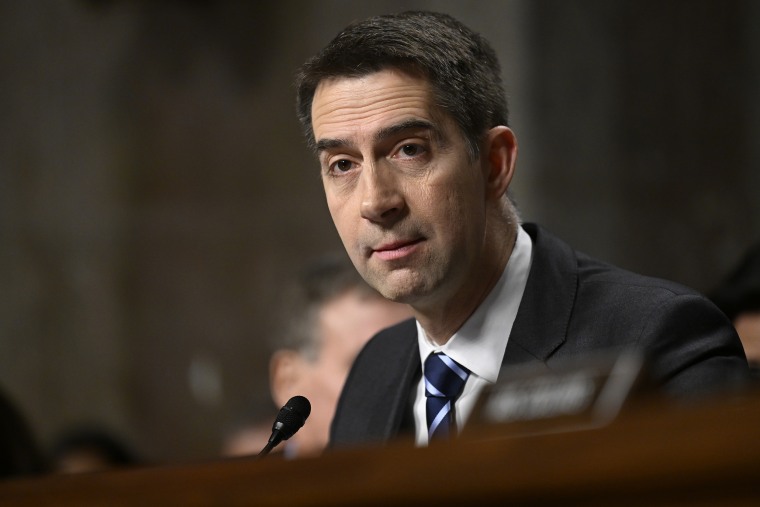A top Republican senator is proposing a sweeping overhaul of the Office of the Director of National Intelligence, slashing the workforce of an organization that has expanded since it was created in the wake of the Sept. 11 attacks.
Under a bill by Sen. Tom Cotton of Arkansas, the chair of the Intelligence Committee, the ODNI’s staff of about 1,600 would be capped at 650, according to a senior Senate aide familiar with the proposed legislation.
ODNI’s workforce was about 2,000 in January, but National Intelligence Director Tulsi Gabbard has already overseen a reduction of about 20% as part of the Trump administration’s drive to shrink the federal workforce. The reduction in the staff Gabbard oversees could weaken her role in the intelligence bureaucracy at a time when she appears to have fallen out of favor with the White House.
The Senate staffer, who spoke on the condition of anonymity, said that Cotton and other Republican senators have been working on the proposed reform for months and that their effort preceded Gabbard’s appointment.

Cotton declined to comment. An ODNI official said Gabbard and her staff have been holding discussions for months with congressional staff members about plans for extensive reforms and cuts at the agency.
“All parties are interested in advancing reforms that refocus ODNI on its core, national security mission,” the official said.
The official did not comment directly on Cotton’s bill. But the official wrote in a message that Gabbard has detailed plans to make the ODNI more efficient and that “there will be more announcements to this effect coming soon.”
“Find another agency who has reduced 25% of their workforce in 4 months on the job, saved millions of dollars in taxpayer money, and developed organization wide reform plans that set the example for all IC [intelligence community] elements to emulate,” the official said.
Cotton praised Gabbard in April after she announced a 25% reduction in staffing.
Although lawmakers from both parties have suggested the ODNI should be reformed, it’s not clear whether Cotton’s bill will secure sufficient support to proceed and whether the Trump administration will endorse the proposal.
Senior Trump administration officials held a classified briefing Thursday for senators on the U.S. airstrikes on Iran’s nuclear facilities. CIA Director John Ratcliffe, Secretary of State Marco Rubio, Defense Secretary Pete Hegseth and the chairman of the Joint Chiefs of Staff, Air Force Gen. Dan Caine, briefed the lawmakers, but Gabbard did not take part.
A senior administration official said Gabbard was focused on her role as director of national intelligence and played down the fact that she was not part of the group that met with senators.
President Donald Trump appears to have sidelined Gabbard in recent months, NBC News has reported. But allies of Gabbard, a former Democratic congresswoman, say that even though there is some friction with the White House, the tension has been overstated.
Created after 9/11
The attacks of Sept. 11, 2001, exposed a failure to share information across spy agencies with catastrophic results. As a result, Congress established the ODNI to oversee all of the country’s 18 intelligence services, including the CIA, and manage bureaucratic turf wars from a complex outside Washington, D.C.
What started as a relatively small office under the national intelligence director in 2005 has expanded over the last 20 years to include in-house analysis teams and centers focused on counterterrorism and counterintelligence. Cotton has described the ODNI as a bloated bureaucracy that should return to its original mission of coordinating the work of other spy agencies instead of producing its own reports and duplicating other agencies’ efforts.
“Congress in no way wanted yet another unruly bureaucracy layered on top of an already bureaucratic intelligence community,” Cotton said at Gabbard’s confirmation hearing in late January. “Unfortunately, 20 years later, that’s exactly what the ODNI has become.”
Gabbard herself expressed support for downsizing the ODNI’s workforce at the hearing, saying she would work with Cotton and other lawmakers to eliminate “redundancies and bloating.”
Centers shifted to other agencies
The bill, known as the Intelligence Community Efficiency and Effectiveness Act, would shift a counterterrorism center to the FBI and a center on proliferation and biosecurity to the CIA. The ODNI’s National Intelligence Council, which oversees analyses across U.S. spy agencies, would no longer draft intelligence analyses; instead, it would coordinate the reports created by other elements of the intelligence community.
The ODNI would no longer have “centers” focused on specific threats or subjects, such as a climate security advisory council. The Foreign Malign Influence Center, which has overseen efforts across the federal government to track efforts by Russia and other adversaries to try to interfere in U.S. elections and decision-making, would also be eliminated.
Many of the ODNI employees who would be cut would return to their home agencies in the intelligence community, the Senate staffer said. The 650 or so who remain there would be considered ODNI’s “top performers.”

